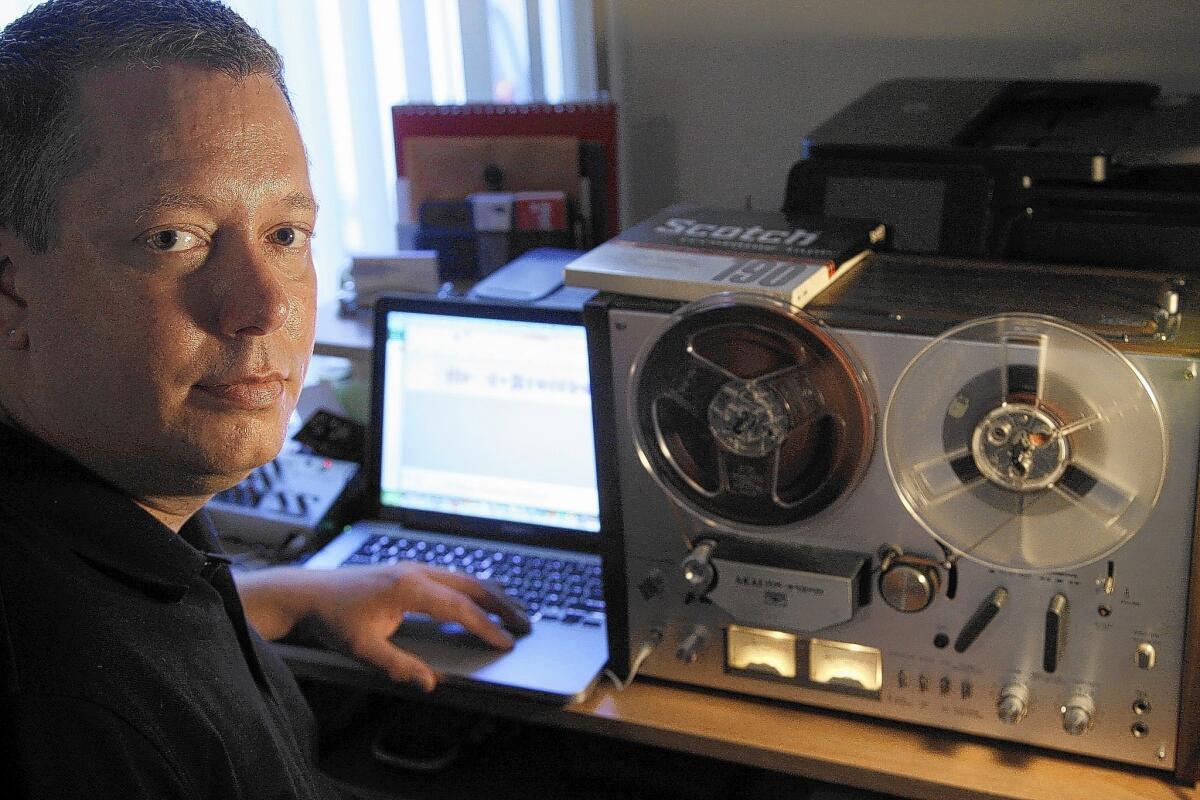On UCLA tapes, one can hear Rivers, Fonda and other figures of speech

- Share via
Derek Bolin salvaged history in the living room of his Los Angeles apartment, digitizing dozens of reels of audio recordings of important — and rarely heard — speeches given at UCLA during the political and social unrest of the 1960s.
Bolin, 44, who recently graduated from the school with a bachelor’s degree in mass communications, has preserved more than 300 speeches, including by British royalty, Ethiopian leaders and American entertainers such as Joan Rivers and Jane Fonda.
Until now, the speeches were accessible only to people who could reach the archived tapes on campus. With almost $13,000 from alumni donations to transfer the tape reels to digital formats, recordings of events that captured the political undercurrents of the tumultuous era will now be available online.
“Having these speeches available for something you’re studying is potentially invaluable,” Bolin said.
Bolin, now in the final stages of uploading the recordings to YouTube, spent the last nine months listening to the whir of a 1960s-era reel-to-reel machine he found on Craigslist as it spooled through hundreds of hours of tape.
Among the speeches he digitized is the bawdy banter of poet Swami X, renowned for his risque performances at Venice Beach and in Berkeley. In another recording, artist Peter Max explains how he found enlightenment through yoga. Bolin also saved a speech by Kathleen Cleaver, a former Black Panther spokeswoman, in which she talked about shootouts and imprisonment involving African Americans.
“We were young and enthusiastic that there would be a worldwide revolution then,” Cleaver recalled in a recent interview. She’s using the speech to finish writing her memoir, “Memories of Love and War.”
The digitization project, which Bolin undertook early this year at the request of the chairman of the Department of Communication Studies, hit a few snags along the way. The first reel-to-reel machine burned out, and the second, found on Craigslist, was a little rickety.
“They weren’t in the best of shape. I had to MacGyver them along the way,” Bolin said, referring to the resourceful secret agent TV character from the 1980s.
Bolin created a digital archive of 365 speeches given at UCLA from 1962 to 1973 that were originally organized by the now-defunct Associated Students Speakers Program, which brought influential figures to campus. Lately, he’s been adding closed captioning on the most popular recordings.
“It’s like a microcosm of news, arts and politics from that era — and it’s a really interesting era,” said Tim Groeling, a professor and chairman of the communication studies department who initiated the project.
So far, the most popular recordings feature actress Mae West, satirist Lenny Bruce, screenwriter and playwright Rod Serling, and actors Jack Lemmon and Walter Mathau. Other speakers include Jonas Salk, the inventor of the polio vaccine; Holocaust survivor Elie Wiesel; and boxer Muhammad Ali.
A speech that actress and comic Carol Burnett gave in February 1973 was the first one that Bolin digitized and posted as a test a year ago.
“I doubt if what I’ll say will go in a time capsule,” Burnett said before launching into a Q&A session with students.
Instead, it’s now on the Internet.
Today, most of the audience for the online recordings is outside the student demographic, Groeling said. YouTube analytics show that a quarter of the 85,000 people who have listened to the recordings are between 25 and 34. Many stumble on them from sites that cater to niche interests, like Reddit or comedy circles.
If the department hadn’t digitized the speeches, Groeling said, they would have been lost, because magnetic tape degenerates over time.
“The tapes were always available as a resource for the public, but I think that meant a very different thing before the Internet,” he said.
Twitter: @haydensaraa
More to Read
Sign up for Essential California
The most important California stories and recommendations in your inbox every morning.
You may occasionally receive promotional content from the Los Angeles Times.













